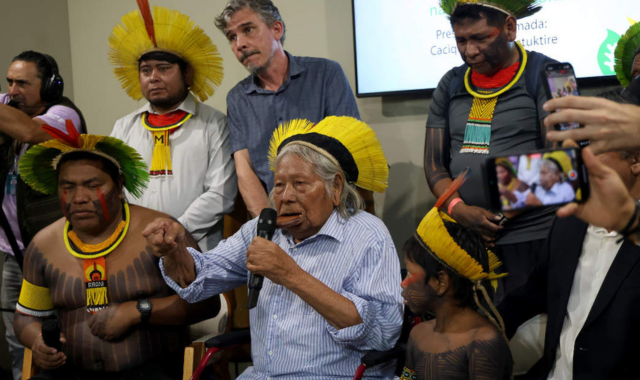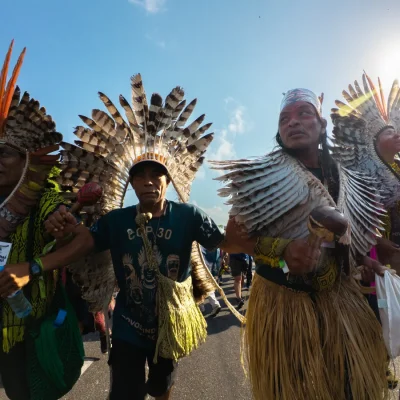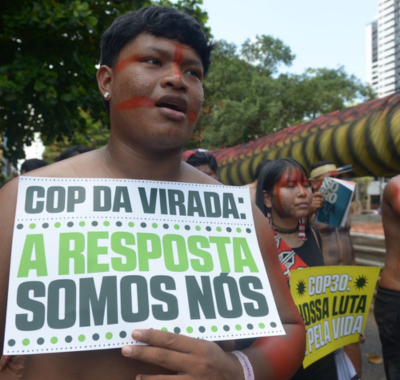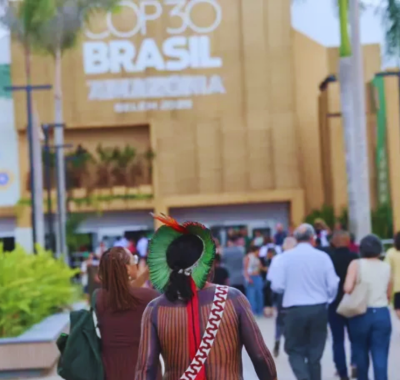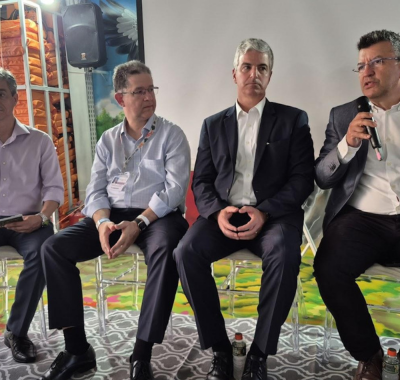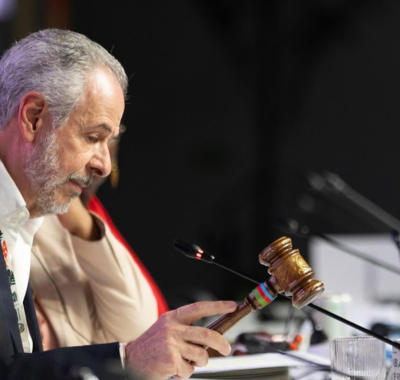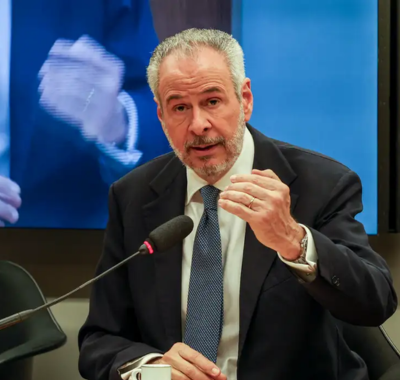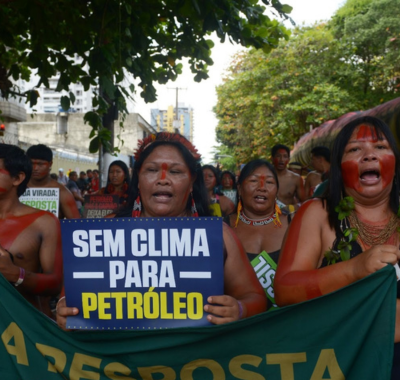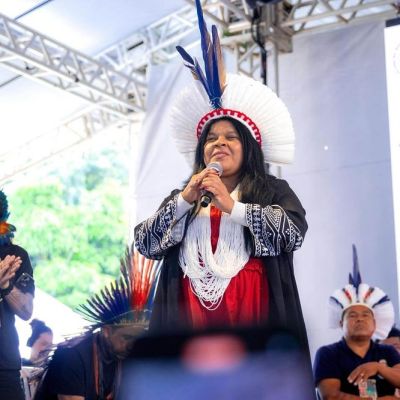Indigenous leaders from Pará and Amapá, researchers, unions, and prosecutors participated in an event organized by the Federal Prosecution Service during COP30
By Isabel Harari
FROM BELÉM (PA) — Chief Raoni Metuktire and other Indigenous leaders from the Amazon region criticized on Tuesday (11) President Lula’s support for oil exploration in the Equatorial Margin, a coastal region stretching from Amapá to Rio Grande do Norte, including the mouth of the Amazon River.
“I know they want to drill for oil, I know Lula is talking about it, but I want to say that we cannot allow this to happen,” said the 90-year-old Indigenous leader during an event organized by the MPF (Federal Prosecution Service) in the Green Zone of COP30 in Belém (PA).
The warning echoed protests from other Indigenous people from Pará and Amapá present at the meeting. “It is sad to see Lula defending this at COP. The world can no longer continue with oil exploration,” said Luene dos Santos Karipuna, executive coordinator of the Coordination of Indigenous Peoples and Organizations of Amapá and Northern Pará.
At the end of October, the Brazilian Institute of Environment and Renewable Natural Resources (IBAMA) granted an operating license to Petrobras to begin exploratory drilling of a well at the mouth of the Amazon basin for the purpose of oil exploration. The concession sparked protests from environmental organizations and civil society. According to the state-owned company, drilling is scheduled to begin “immediately.”
“IBAMA authorized the start of research without listening to the Indigenous people, completely erasing us from the place where we live,” Luene laments.
At COP, the issue continues to be discussed at parallel tables and in conversations in the corridors of the Green Zone, a space open to the public. Fossil fuels (such as oil, coal, and natural gas) are the main source of greenhouse gas emissions, such as CO2, which are responsible for global warming.
“President Lula is the one who has demarcated the most indigenous lands. But we are saddened when he talks about climate change and then speaks in favor of oil exploration,” agrees Edmilson Karipuna, coordinator of the Council of Chiefs of the Indigenous Peoples of Oiapoque, the CCPIO. “We will always say no to oil exploration,” he reinforces.
IBAMA’s license to Petrobras causes impacts in Amapá, say organizations
Indigenous people are already reporting impacts on their territories and in the municipality of Oiapoque (AP), on the border with French Guiana, as a result of the license issued by IBAMA, such as population growth, increased violence, and invasions of Indigenous territories.
“We are concerned about the environmental impacts that may occur with exploitation, but we are also concerned about the social impacts that are already underway,” says Jenina Karipuna, chief of the Espírito Santo village and president of AMIM (Association of Indigenous Women in Collective Work).
“We cannot continue in the Green Zone listening to ourselves. We should be in the Blue Zone, sitting in the discussion room with the leaders,” emphasizes Luene.
In the corridors of the Blue Zone, the area for official negotiations where only accredited individuals are allowed, Governor Helder Barbalho (MDB-PA) defended oil exploration. “We need to use Petrobras’ wealth to finance and anticipate this [just] energy transition. Today, Brazil is not self-sufficient in energy to guarantee energy security without the use of [fossil] fuels,” the governor told Repórter Brasil on Monday (10), when asked how to make the energy transition fair.
The same question was asked to Rodrigo Agostinho, president of IBAMA, who signed the license. “I have no doubt that the energy transition will take place in the field of fossil fuels,” he said, adding that “if we don’t keep the forest standing, all this work will be thrown away.”
Indigenous people of Amapá denounce that their right to consultation has been violated
“Our rights are guaranteed here,” says Chief Edmilson Karipuna, showing the consultation protocol for the Indigenous Peoples of Oiapoque. “But they are being trampled on by the government. We are fighting for the consultation with Indigenous Peoples to take place.”
The consultation protocol for the Indigenous Peoples of Oiapoque was published in 2019 and establishes the rules for consultation to take place. The hearing must be held on any project that may affect Indigenous Peoples and has been law in Brazil since 2004, when Brazil ratified Convention 169 of the ILO (International Labor Organization).
A few days after the license was issued, the Federal Prosecution Service filed an appeal with the Federal Regional Court-1 requesting the immediate prohibition of any environmental licensing process without the prior completion of the necessary actions and studies.
“There are flaws in environmental licensing, and the most serious of these is the total disregard for traditional Peoples and communities,” points out Felipe Palha, chief prosecutor of the MPF in Pará.
“It is sad to see that after 30 years of the Federal Prosecution Service fighting against large-scale projects in the Amazon, they are still using the same modus operandi in the 21st century that they used in those large projects. In the case of the Amazon River mouth, we see the same thing happening as in the past. That is perhaps the saddest thing. Here we have an even greater scale, because today we have sufficient information about the people who will be impacted, the quantification, who these people are, where they are, and even so, the federal government insists on making it unfeasible for them,” laments prosecutor Felicio Pontes.
This report was produced by Repórter Brasil, through the Collaborative Socio-environmental Coverage of COP 30. Read the original report here.

